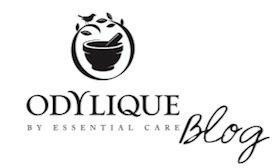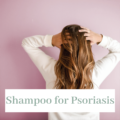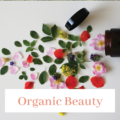
It’s fairly easy to understand what goes into something like chocolate and what the difference between organic and non-organic chocolate is (the organic one will be from cocoa beans and sugar grown without artificial fertiliser and pesticides.) But we’re often asked at Odylique how you make organic shampoo, and what the difference is between shampoo from natural ingredients and shampoo containing chemicals like sulfates and silicone.
Background to Making Organic Shampoo
Back in the 1990s, formulating a natural shampoo was even harder than it is now. Natural – let alone organic – shampoo did not exist, so there was no formulation guideline. But our formulator and co-founder Margaret was keen to find a natural alternative for a friend who suffered scalp psoriasis.
Much research and development later and our original Gentle Herb Shampoo was born. However, while it had ingredients that on paper did the same job as regular synthetic shampoo (cleans your hair as well as!) the natural nature of the Gentle Herb Shampoo was very different and produced much better results.

What is Conventional Shampoo?
When we refer to ‘conventional shampoo’, we mean shampoo that doesn’t have organic certification, they’re usually what you’ll find on most shop shelves. Let’s start from the top of the label or ingredient (INCI) list and work down:
Water
Firstly, there’s water (aqua). Shampoo is quite liquid, so in most standard shampoos you’ll find quite a lot of H2O. At Odylique we like to use organic aloe vera juice as this helps lock in moisture, we also add water that’s made very pure by reverse-osmosis technology.
Detergent
Next comes the detergent, the bit that does the cleaning, and makes the bubbles. Here there is a significant difference too. We use an eco-friendly, gentle foaming cleanser made from coconut and corn sugar whereas most shampoo formulations use the strong and potentially irritant detergent sodium lauryl sulphate (SLS) or its less eco-friendly cousin, sodium laureth sulphate.
Sadly we are seeing sulfates creeping back into some shampoos that clam to be ‘natural’ and ‘organic’. Odylique do not use sulfates such as SLS and recommend you always check the ingredients labels.
You can read more about why to avoid sulfates in our article:
Six Reasons To Choose Sulphate Free Shampoo
Conditioning Agents
Then we have the conditioning agents and these again can differ widely, with the best organic shampoo using plant oils, like coconut oil, and herbs, that benefit the hair and scalp.
The more synthetic shampoos rely on silicones and film-forming agents (like copolymers and quaternium compounds) to coat the hair and give a feeling of ‘slip’ rather than give any active nourishment. – Some film formers also pose skin sensitivity* or health risks and are not eco-friendly.
This is why we suggest that you leave our organic shampoos on your scalp for a few minutes to absorb all the botanical goodness!
Thickeners
A little further down we have thickeners and in a natural shampoo you might find plant gums. Synthetic shampoos tend to use foam boosters or ‘buffers’ like cocamide MEA or DEA, PEGS and often salt (sodium chloride). Cocamide DEA in particular raises concern due to its toxicity data.
Preservatives
Now there’ll be something to keep the shampoo from going bad. Conventional formulators need to ensure that their shampoo can sit on the shelves for many years before being sold, so they will choose the stronger, but more controversial preservatives like parabens or methylisothiazolinone (MI). A more natural shampoo might contain benzoate or sorbate preservatives.
Odylique organic shampoo, uses a more natural system of plant stabilisers.
Fragrance and Colour
Finally the scent and smell, which are not a large part of the formulation, but can make a large difference if you have sensitive skin. Artificial fragrance (parfum) is often found in supermarket shampoo. It’s cheap, but is one of the most common causes of skin sensitivity.
Artificial colour is also very common, particularly if the shampoo is in a clear bottle – it looks lovely to have a bright orange or yellow shampoo, but it takes some fairly strong synthetic colours to achieve it!
Organic shampoo will use organic essential oil if it is scented, and typically no added colour.
Summary
So there you have it; an insider’s guide to what’s in organic shampoo verses synthetic shampoo.
As you can see many of the ingredients in synthetic shampoo can cause sensitivity and may even have long-term health concerns. However, there are great organic and natural alternatives that bring extra benefits to your hair and scalp.
If you are keen to try out an organic shampoo, be sure to check the ingredients; not all ‘organic’ shampoos are certified. Look for an official logo (e.g. the Soil Association) to make sure there aren’t any obscure chemicals that you’d rather avoid.
Of course we would love you to try one of our award winning organic shampoos
Our Hair Care Products:
 |
 |
 |
| Gentle Herb Shampoo | Ultra Rich Balm | Tea Tree and Herb Shampoo |
Want To Try Our Products?
We only source the kindest ingredients from trusted suppliers who don’t practice unethical or cruel methods of farming, which is why we are able to label every single one of our products cruelty free!
Use code: Shampoo20 at the checkout for 20% off your order! – *Limited to one use per customer*
Natural Remedies for Eczema – 5 Simple Tips

As an eczema family, we’re all too familiar with the…




